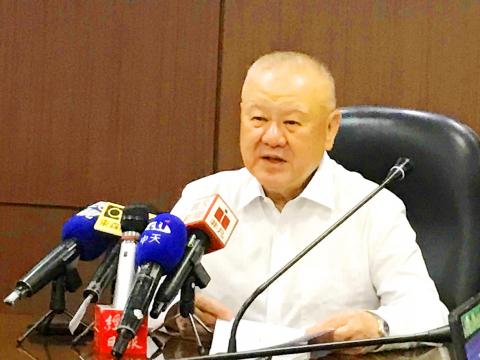Business leaders yesterday welcomed an Executive Yuan proposal to scrap the stamp tax, saying the move to ditch an obsolete levy was long overdue and would help simplify the nation’s taxation system.
The Chinese National Association of Industry and Commerce (工商協進會) urged local governments to support the Cabinet’s decision to abolish the tax, which generates about NT$12 billion (US$381.7 million) in annual tax revenue.
“It is an outdated duty the government has promised to address, but has failed to take action until now,” association chairman Lin Por-fong (林伯豐) told a news conference in Taipei.

Photo: Lee Ya-wen, Taipei Times
The business group has pushed for the tax’s abolition for decades and Premier Su Tseng-chang (蘇貞昌) gave a positive feedback during a meeting in May, he said.
Stamp tax revenues go directly to local government coffers, with tax rates of 1 to 4 percent on four types of documents: receipts for certain monetary payments, contracts to perform a specific job or task, contracts for the sale of movable properties, and contracts for the sale and transfer of real estate.
The group has argued that the stamp tax overlaps with the business tax, which subjects all business transactions to a 5 percent levy whether or not they turn a profit.
The stamp tax is unfavorable to business activity and fuels controversy, as taxpayers and authorities often disagree over taxable terms, Lin said.
The news conference came after local governments voiced their opposition to the proposal, saying it would deprive them of an important source of income amounting to NT$1 billion a year.
The Ministry of Finance on Wednesday reiterated that it would amend the Act Governing the Allocation of Government Revenues and Expenditures (財政收支劃分法) and use the central government’s money to make up for revenue shortfalls.
New Taipei City Mayor Hou You-yi (侯友宜) raised concern that the suggested subsidy might come from funds originally earmarked for the city.
All local administrators frown on axing the stamp tax.
A lack of trust between local and central governments should not be the reason to keep the stamp tax, Lin said.
Rather, the Cabinet should talk to local administrators to calm their worries and try to meet their financial needs the best it can, Lin said.
The Cabinet has listed the stamp tax as a priority bill in the forthcoming legislative session.
The association would next move to lower commodity taxes among others, Lin said, after a recent setback over the increase in basic wages.

Taiwan Semiconductor Manufacturing Co (TSMC, 台積電) last week recorded an increase in the number of shareholders to the highest in almost eight months, despite its share price falling 3.38 percent from the previous week, Taiwan Stock Exchange data released on Saturday showed. As of Friday, TSMC had 1.88 million shareholders, the most since the week of April 25 and an increase of 31,870 from the previous week, the data showed. The number of shareholders jumped despite a drop of NT$50 (US$1.59), or 3.38 percent, in TSMC’s share price from a week earlier to NT$1,430, as investors took profits from their earlier gains

In a high-security Shenzhen laboratory, Chinese scientists have built what Washington has spent years trying to prevent: a prototype of a machine capable of producing the cutting-edge semiconductor chips that power artificial intelligence (AI), smartphones and weapons central to Western military dominance, Reuters has learned. Completed early this year and undergoing testing, the prototype fills nearly an entire factory floor. It was built by a team of former engineers from Dutch semiconductor giant ASML who reverse-engineered the company’s extreme ultraviolet lithography (EUV) machines, according to two people with knowledge of the project. EUV machines sit at the heart of a technological Cold

Taiwan’s long-term economic competitiveness will hinge not only on national champions like Taiwan Semiconductor Manufacturing Co. (TSMC, 台積電) but also on the widespread adoption of artificial intelligence (AI) and other emerging technologies, a US-based scholar has said. At a lecture in Taipei on Tuesday, Jeffrey Ding, assistant professor of political science at the George Washington University and author of "Technology and the Rise of Great Powers," argued that historical experience shows that general-purpose technologies (GPTs) — such as electricity, computers and now AI — shape long-term economic advantages through their diffusion across the broader economy. "What really matters is not who pioneers

TAIWAN VALUE CHAIN: Foxtron is to fully own Luxgen following the transaction and it plans to launch a new electric model, the Foxtron Bria, in Taiwan next year Yulon Motor Co (裕隆汽車) yesterday said that its board of directors approved the disposal of its electric vehicle (EV) unit, Luxgen Motor Co (納智捷汽車), to Foxtron Vehicle Technologies Co (鴻華先進) for NT$787.6 million (US$24.98 million). Foxtron, a half-half joint venture between Yulon affiliate Hua-Chuang Automobile Information Technical Center Co (華創車電) and Hon Hai Precision Industry Co (鴻海精密), expects to wrap up the deal in the first quarter of next year. Foxtron would fully own Luxgen following the transaction, including five car distributing companies, outlets and all employees. The deal is subject to the approval of the Fair Trade Commission, Foxtron said. “Foxtron will be